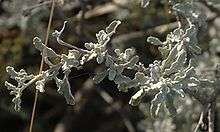Parthenium incanum
| Mariola | |
|---|---|
 | |
| Parthenium incanum growing in Walnut Canyon at Carlsbad Caverns National Park, New Mexico | |
| Scientific classification | |
| Kingdom: | Plantae |
| (unranked): | Angiosperms |
| (unranked): | Eudicots |
| (unranked): | Asterids |
| Order: | Asterales |
| Family: | Asteraceae |
| Tribe: | Heliantheae |
| Genus: | Parthenium |
| Species: | P. incanum |
| Binomial name | |
| Parthenium incanum Kunth[1] | |
Parthenium incanum, with the common names mariola and New Mexico rubber plant, is a plant in the genus Parthenium of the family Asteraceae. [2]
The plant is native to North America, from the Southwestern United States through Northern, Central, and Southwestern Mexico.[2] Habitats include desert grasslands including in the Chihuahuan Desert, on dry gravel slopes, and on plains.
Description
Parthenium incanum grows from 1.5–3 feet (0.46–0.91 m) in height and width. Its foliage is a pubescent grayish-white. Small white flower clusters appear from July to October.[3]
Uses
Medicinal
The Jicarilla Apache used mariola as a traditional medicinal plant. It was prepared by boiling the plant's leaves, and the solution was then was rubbed over a pregnant woman's abdomen to relieve discomfort. [4] [5]
Cultivation
Parthenium incanum is cultivated as an ornamental plant, for use in drought tolerant, native plant, and wildlife gardens. [3] [6]
References
- ↑ Nova Genera et Species Plantarum 4:260, t. 391. 1820 "Plant Name Details for Parthenium incanum". IPNI. Retrieved June 30, 2010.
- 1 2 USDA−GRIN: Parthenium incanum
- 1 2 Lady Bird Johnson Wildflower Center Native Plant Information Network (NPIN): Parthenium incanum (mariola)
- ↑ University of Michigan at Dearborn: Ethnobotany of Parthenium Incanum
- ↑ Opler, Morris E. (1946). Childhood and youth in Jicarilla Apache society. Publications of the Frederick Webb Hodge Anniversary Fund (Vol. 5). Los Angeles: The Southwest Museum Administrator of the Fund.
- ↑ Aggie-horticulture.edu—Texas Native Plants Database: Mariola (Parthenium incanum)